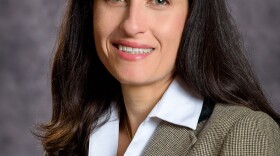Childhood trauma takes time to heal. It also requires resources that may not be easy to find. Deb Gordon-Gurfinkel decided to use her experience in drama education to create a program called "Telling It." It uses arts as a means to help troubled youth in Ann Arbor and Ypsilanti. Gordon-Gurfinkel joined WEMU's David Fair to discuss "Telling It" on this week's "Washtenaw United."
WEMU has partnered with the United Way of Washtenaw County to explore the people, organizations, and institutions creating opportunity and equity in our area. And, as part of this ongoing series, you’ll also hear from the people benefiting and growing from the investments being made in the areas of our community where there are gaps in available services. It is a community voice. It is 'Washtenaw United.'


“Telling It” is a trauma-informed community-based program for school age youth.
Deb Gordon-Gurfinkel founded and piloted Telling it in Ann Arbor in 2002 after moving from the San Francisco Bay Area. While out west, she volunteered with children that, along with their families, were experiencing homelessness. Once settled in Ann Arbor, she was made aware of the mental health and educational struggles of children that had experienced homelessness through the Ypsilanti shelter organization SOS Community Services.
Deb Gordon-Gurfinkel used her training as a Drama In Education specialist from the Central School of Speech and Drama in London, England, where she grew up, in the development of “Telling It.” It became clear a trauma-informed program was needed because the children and teens in the program were sharing such deeply personal stories. “Telling It” offers the expressive arts such as the visual arts, poetry, role-play, music and hip hop, blended with social work and education, as platforms for personal expression without judgment or censorship.
By collaborating with the children and teens to create an environment of trust and intimacy, the “Telling It” team, led by a social worker and a site leader, step in and find shelter for a homeless teen that has no family to support him, identify and support children and teens that have shared that they want to harm themselves or that others are harming them. They use their trauma-informed training to decode behavior and look for ways to support children and teens in building resiliency beyond what their short years have already forced upon them.
Non-commercial, fact based reporting is made possible by your financial support. Make your donation to WEMU today to keep your community NPR station thriving.
Like 89.1 WEMU on Facebook and follow us on Twitter
— David Fair is the WEMU News Director and host of Morning Edition on WEMU. You can contact David at 734.487.3363, on twitter @DavidFairWEMU, or email him at dfair@emich.edu






